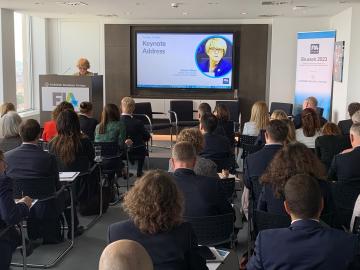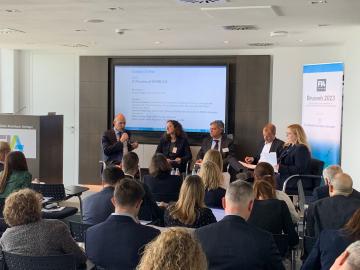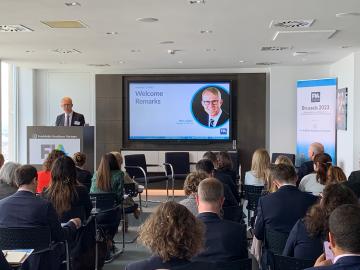FIA came to Brussels on 23 May to host a forum for policymakers and industry participants to discuss the latest developments in the cleared derivatives markets in Europe. Top of the discussions were the European Commission’s review of the European Market Infrastructure Regulation (EMIR 3.0) and oversight of Europe’s energy and commodities markets.
Danuta Hübner, member of the European Parliament's Committee on Economic and Monetary Affairs (ECON), opened the discussions with a keynote address on the EMIR review, which she described as providing the opportunity for the EU to reassess market infrastructures and ensure that “the EU clearing framework provides safe and competitive support for a well-functioning capital markets union”.
“EMIR 3.0 includes measures that take us in this direction,” Hübner said, highlighting the Commission’s proposals to streamline supervisory procedures for the approval of new products and model changes for EU central counterparties as examples.
“The Commission conducted a thorough, deep process of consultation and has taken into account feedback from all stakeholders. Proposals to expand offerings more rapidly and simplification and reduced burden are shining parts of this review. We all have heard stories about EU CCPs facing damaging delays in obtaining approval for products or risk models, so these proposals are overwhelmingly positive.”
One of the most far-reaching proposals by the Commission is a requirement for financial institutions subject to the EU EMIR clearing obligation to hold "active accounts" at CCPs in the EU and use those accounts to clear a proportion of their euro-denominated swaps trading.
The Commission says this will improve EU regulators’ oversight of the vast euro-denominated derivatives market and reduce the EU’s over-reliance on UK-based clearing services. If the proposal is accepted, ESMA will have responsibility for determining the minimum level of activity in the active accounts.
“The main consensus of clearing members and clients related to the active account revolves around the impact that this requirement will have on their international competitiveness, and I think that this is a very important concern to have,” Hübner said.
“One issue is that clear data to inform the decision of ESMA on the active account requirement is lacking and the feedback I have had so far seems to indicate that the cost and benefits and the impact of such a requirement are difficult to estimate,” she said. “After the draft report, we will start negotiations with other political groups, but at this stage we might be divided as well on our approach to the active account and a compromise solution is not always the best choice.”
Financial Stability
Discussions on EMIR 3.0 continued during the fireside chat with Fiona van Echelpoel, deputy director general, DG Market Infrastructure and Payments at the European Central Bank, and Anamarija Staničić, head of Division at the Croatian Financial Services Supervisory Agency (HANFA).
Asked whether EMIR 3.0 is fit for purpose to address the ECB’s perceived financial stability concerns, van Echelpoel said the ECB is in favour of the proposals.
“As the lender of last resort, we always have financial stability considerations in mind,” van Echelpoel said. “Any disturbance in the clearing ecosystem could impact euro area credit institutions’ liquidity positions, which could feed into the financial market segments that are relevant for us when it comes to monetary policy.”
Van Echelpoel said that around 80% of the total notional outstanding of euro denominated interest rate swaps are cleared outside the EU, which “is a very high number for the ECB”. In addition, about 50% of EU clients active in the euro-denominated interest rate markets do not clear trades in the EU.
“In a severe crisis, what is a concern for us is that there would not be an EU authority with a hand on the steering wheel. It's not that we have doubts about the actions of other authorities, but there could be unintended consequences for other jurisdictions, and this is why overreliance is a particular issue,” she said.
“On the EU client side, we see that 50% have business only in euro denominated transactions, so the argument that there needs to be the netting benefits of trading outside of the EU doesn’t always apply. There is potential there to have more business at EU level,” she added.
Offering a different view, HANFA’s Staničić said that being uncomfortable with overreliance on any third country jurisdiction is a natural reaction, but it is not possible to reduce systemic risk by diffusing it between different CCPs.
“From a purely theoretical point of view, you would be creating a more complex system where a crisis in one CCP would quickly move to the next because of the shared clearing membership, and you may lose overview of the entire system at the same time, which would create more risk in the system,” she said. “The problem with trying to attract a portion of liquidity to the EU is that you're creating a smaller liquidity pool, which is more brittle and fragile in a crisis.”
Staničić also spoke about netting, saying the benefits of using a third country CCP were important, particularly for larger banks.
“For the larger clearing members and for their counterparties which come from third countries, the netting benefits from the currencies that are available in the UK that are currently not available in Europe are significant,” she said. “This will take time to build. We can’t make third-country counterparties to our European clients, banks and clearing members come here, and they won't come here unless they have a real economic incentive.”
Clearing Competitiveness
The panel that followed took a deeper dive into the EMIR 3.0 proposals with one panellist from Eurex noting that despite developing an alternative liquidity pool with positive feedback from the market and growing market share, market participants are still “sitting on the fence”.
“If we look at developments over a five-year period, we have a 20% market share from an outstanding perspective, we have 600 clearing members and clients onboarded and we have built out a value proposition, improving our service offering based on many conversations we have had with many market participants on the sell side and the buy side,” said Matthias Graulich, member of the executive board of Eurex Clearing.
“People are looking for competition, choice and risk diversification, but what we also observe is over the last two years there has been stagnation with people sitting on the fence. How do we achieve progress on that aspect? Stagnation is not really an option if the EU wants to achieve its objectives.”
Offering a buy side perspective, Susan Yavari, senior regulatory policy advisor at the European Fund and Asset Management Association, talked about costs to buy side firms.
“As a buy side, we would no longer be able to have free choice of where we clear. It means that we will have a two-tier structure towards our clients. Under the clearing obligation, we will have to clear certain trades without always getting the best rates,” she said. “From a best execution standpoint this is going down a slippery road. There is also an operational build that would be required for us to switch from what is typically a mono CCP channel to a dual CCP channel, which is quite significant.”
Gilbert Sintès, head of exchange traded derivatives clearing Europe at Santander, said that a strategy based on market-driven solutions and innovation should be the key to boosting competitiveness of EU CCPs.
“As a European clearing bank, I am supportive of an initiative focused on the EU financial market infrastructure and see the strategic importance of having an exchange and CCP clearing offering linked to the capital markets union. This is fundamental,” Sintès said.
“However, there should not be a regulatory mandate to clear through a European CCP solution. We are an intermediary that provides the best and most efficient access possible to any market any time during the trading session and it is the client choice, because of their investment strategies, because they are exposed to many instruments across currencies, to decide whether a CCP offering is competitive or not and whether it provides liquidity and transparency or not. I would like the EMIR 3.0 proposal to be built upon the merits of a CCP offering, not by making [clearing in the EU] compulsory,” he said.
“I am concerned from a liquidity fragmentation point of view and by the fact that there could be a dislocation risk, which is bad for the markets in general and for our clients. This is not the way, at least from my perspective, to move forward,” Sintès said.
Other aspects of EMIR 3.0 got a positive reception from the panellists, including measures to simplify the procedures for CCPs launching products and changing models as well as a non-objection procedure for certain changes.
Commodity Markets
The forum concluded with a lively panel discussion on recent European regulatory developments in commodities markets including the regulatory response to recent episodes of energy market volatility.
The panellists also discussed recent proposals from the European Parliament in relation to the MiFID II/MiFIR Fundamental Review, including an adjustment of position limits and a narrowing of the ancillary activity exemption, as well as a mandate for ESMA to define the principles for establishing the technical parameters of exchanges’ circuit breakers.
“Circuit breakers are there to halt very erratic trading. What they cannot do is get rid of volatility that is really stretched out over days,” said Anje Stiers, head of the EU Representation Office, European Energy Exchange.
“Looking at the parliament report that suggests more harmonisation, we need to be incredibly careful because circuit breakers are tools for an exchange to ensure orderly trading. We need full discretion in accordance with how our contracts are designed, the type of customers they attract, the liquidity profile and the volatility profile. I personally do not see much room for harmonisation. At EEX we reviewed our circuit breakers again and again because it was needed, and we did so effectively,” Stiers said.
The review of the Regulation on Wholesale Energy Market Integrity and Transparency (REMIT) also came under the spotlight with panellists expressing their concerns about draft amendments in the legislative proposal. These include a proposal for market participants established in a third country to declare an office in a member state in which they are active and to register with the national regulatory authority of that country.
The panellists noted that this would be onerous for third country market participants who use the EU energy and power markets for risk management purposes and would have a negative impact on the liquidity of these markets.
FIA will continue its European events with forums in Leipzig and Frankfurt on 29 June and 12 October.
The forums provide an opportunity for discussions to take place between regulators and the industry, and for participants to engage in productive conversations about the issues affecting their markets.
Visit FIA.org/events for more information on events taking place this year.
Read FIA President and CEO Walt Lukken’s opening remarks at the Brussels forum.






